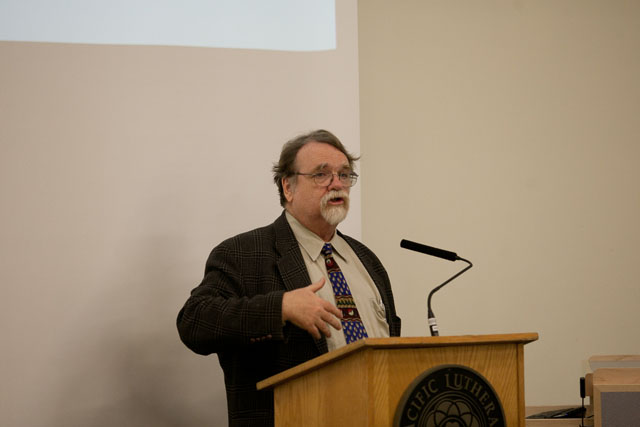Page 49 • (1,065 results in 0.031 seconds)
-
The Lavender Community seeks to honor, celebrate, and uplift the lived experiences of LGBTQ+ students.
broader Tacoma area. The significance of “Lavender” Lavender Graduation Ceremonies are held across the country every year. The origin of the term “lavender” has many variations. According to the Human Rights Campaign (HRC), lavender is a combination of the pink triangle that gay men were forced to wear in concentration camps and the black triangle designating lesbians as political prisoners in Nazi Germany. The LGBTQ civil rights movement took these symbols of hatred and combined them to make symbols
-
Mission: “Educating caring, skillful generalists to be ethical agents for global and local change.” The Pacific Lutheran University Department of Social Work is dedicated to educating individuals
competently and effectively engage in change work in various political, geographical, socioeconomic, and other settings.
-

Associate Professor of Biology Jacob Egge works with students during a summer semester research project. (Photo by PLU Photographer John Froschauer) Faculty-Student Research Provides a Cornerstone of the PLU Mission By Pacific Lutheran University Marketing & Communications and the Office of the Provost This year’s…
, removing trade barriers, opening investment flows and aggregately reducing the provision of social services and support to rural and poor populations. A prominent feature of the neoliberal political-economy has been not only the increase of migration as an economic strategy, but also the elevated presence of nongovernmental organizations (NGOs) doing work in development, with a diverse spectrum of practices and philosophies. Through my experience in Pacific Lutheran University’s Oaxaca study abroad
-
MediaLab staff members keep up a steady workflow of award-winning documentaries. All of our documentaries are listed below in chronological order.
affects those working in helping professions such as health care, social services and law enforcement. The film, partially sponsored by the global relief organization, World Vision, premiered Oct. 8, 2011 in Seattle. A second public showing occurred on the campus of Pacific Lutheran University in early 2012. Adding to its acclaim, the film was later screened on March 26, 2014 as part of the New York City Filmmakers Anthology Series.OIL LITERACY, 2010Oil drives the global economy and supports the
-
It’s not just that the world has changed. It is changing. Every day. And the people who best understand how it’s changing – and the complex reasons why – will be the ones who find success.
interconnectedness (these processes can be social, artistic, literary, political, religious, economic, and/or environmental) Become involved citizens, both locally and globally For more information, go to the Wang Center for Global and Community Engaged Education home page.
-
Most often carved from wood, but historically from clay and metal alloys also, figures can be representations of human beings or spirits.
can a figure be understood for what it expresses and communicates to the people who made it, and the context in which it is used, whether religious, social, educational, political or economic.Figures Yoruba Agere IfaBongo Grave postLobi 1Lobi 2Mossi Ninana PostMoba Tchitcheri Shrine Figure
-
At PLU, four core foundations define the honors curriculum: multidisciplinary approaches historical and internationally focused study intentional intellectual formation and ethical reflection, and
history, literature or art. Similarly, a course in anthropology on Africa’s religious pluralism might also include perspectives on the topic from other disciplines, such as history, economics or literary studies. Historical and Internationally Focused Study: IHON courses ask students to recognize the cultural and historical contexts that shape every artistic, economic, philosophical, political and religious creation. Course themes are also situated internationally, that is, course material is drawn
-
Free inquiry shapes effective worldly intelligence and service in the world. Martin Luther’s free investigation of scripture led to his breakthrough and the posting of the ninety-five theses on
orthodoxy contributed to the Thirty Years’ War; the free thinking of German Lutheran professors had little impact upon Prussian militarism; Lutheran culture contributed to political quietism during the Nazi period. At the same time, Lutheran colleges established by immigrants in the United States came to inherit more fully the freedom of inquiry that was the birthright of the European universities and Lutheran higher education. The Lutheran intellectual tradition, consequently, has lent a highly
-
From Microsoft to Martin Luther, and back again In 1994, Mike Halvorson was the first one to write a book about something nobody else cared about. The book? How to use a little-known software program called Microsoft Office. We can guess how that turned out.…
described it, he “pushed the re-set button.” He decided to earn his master’s – then his Ph.D. – in European history. And soon thereafter, he found himself back at his alma mater teaching about Martin Luther and Reformation Germany (and writing books about the subject, of course). He realizes it is an odd combination: Not many people are experts in cutting-edge computer programming and 500-year old political and religious history. He’s also aware that some people might suggest that, in studying 16th
-

Paul B. Thompson, the W.K. Kellogg Chair in Agricultural, Food and Community Ethics at Michigan State University gave the keynote address for the Food Symposium. (Photo by Igor Strupinskiy ’14) Exploring food issues By Katie Scaff ’13 Food intersects with just about any social justice…
keynote address on three problems in food ethics from Paul B. Thompson, the W.K. Kellogg Chair in Agricultural, Food and Community Ethics at Michigan State University. About 50 students, staff, professors, and community members turned out for the event, including junior Political Science and Global Studies double major Kenny Stancil. “Food is just one of my general academic interests,” Stancil said. “I was intrigued when he pointed out both Singer and Sen’s frameworks for thinking about food ethics
Do you have any feedback for us? If so, feel free to use our Feedback Form.


